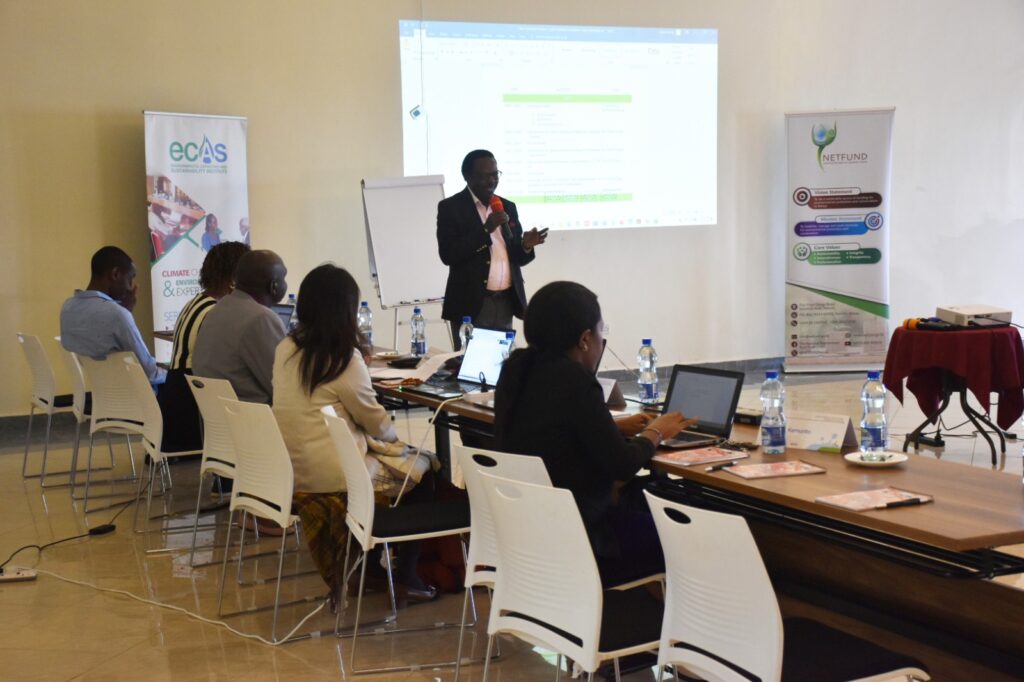
INTERNATIONAL TRAINING ON UNDERSTANDING FOREST CARBON MANAGEMENT
COURSE BACKGROUND
Forests are central to the global climate system, yet the intricate connections between forest management, carbon cycles, and climate policy can be complex to navigate. Many professionals lack a comprehensive understanding of how human decisions impact forest carbon, including the specifics of carbon crediting and other climate initiatives. This knowledge gap can hinder effective climate action and sustainable land management.
ECAS Institute recognizes the increasing importance of robust forest carbon management. We aim to provide an in-depth yet accessible overview of this interdisciplinary field, building confidence in foundational science and practical applications. This course empowers diverse professionals to make informed decisions regarding forest carbon.
This short course is designed to equip participants with a practical and intuitive understanding of forest carbon management. It will cover scientific principles, policy contexts, carbon crediting mechanisms, measurement techniques, and available tools. By fostering a shared understanding across various disciplines, ECAS seeks to enable more effective and impactful forest-based climate solutions.
COURSE OBJECTIVES OF THE TRAINING
Upon completion of this training, participants will gain:
- A robust overview of the connections between forests, climate, and human decision-making.
- Confidence in the foundational science of the carbon cycle and carbon storage.
- An understanding of land management practices specific to carbon, including carbon crediting and other initiatives.
- Knowledge of domestic and international policies relevant to forest carbon.
- Insights into management considerations, carbon measurement techniques, and available tools and support for forest carbon management.
- The ability to identify action paths for various forest carbon-related decisions.
WHAT YOU WILL LEARN
This in-depth short course provides a robust overview to the connections between forests, climate, and human decision-making. The course builds confidence in foundational science, unpacks land management specific to carbon (including carbon crediting and other initiatives) and offers action paths for various decisions. The content is highly interdisciplinary and strives to build shared understanding for diverse professionals.
Topic areas include:
- Carbon cycle and storage science
- Domestic and international policies
- Forest carbon credits and initiatives
- Management considerations
- Carbon measurement
- Available tools and support
The course runs asynchronously, allowing learners to work at their own pace, and includes structured modules, downloadable handouts, and guided assessments. A practical approach allows participants to build an intuitive understanding of the main components of this increasingly important topic.
DURATION AND PROGRAM
(TBC)
TARGET PARTICIPANTS
This course is designed for:
- Natural resource professionals;
- Extension agents;
- All interested individuals are invited to participate.
TRAINING MODULES
The course is structured into several interdisciplinary modules, providing a comprehensive understanding of forest carbon management:
| No | Module | Details | |
| 1. | Foundations of Forest Carbon Science |
This module introduces the scientific principles underlying the relationship between forests and the global climate, focusing on the carbon cycle and how forests store carbon.
|
|
| 2. | Policy and Governance of Forest Carbon |
This module explores the domestic and international policy landscapes that govern forest carbon, including key agreements and frameworks.
|
|
| 3. | Forest Carbon Credits and Initiatives |
This module delves into the specifics of forest carbon crediting schemes and other initiatives designed to incentivize carbon sequestration and emission reductions from forests.
|
|
| 4. | Management Considerations for Forest Carbon |
This module focuses on practical land management strategies and considerations specifically aimed at enhancing carbon sequestration and retention in forests.
|
|
|
5.
|
Measuring and Monitoring Forest Carbon |
This module provides an overview of the tools and techniques used to measure and monitor carbon stocks and fluxes in forest ecosystems.
|
|
| 6. | Tools, Support, and Action Paths |
This module synthesizes available resources, tools, and support systems for forest carbon management, guiding participants on actionable steps for various decision-making contexts.
|
|
TRAINING STYLE
The modules will be taught through PowerPoint presentations, and lectures and will include a case study/field visit, breakout sessions, case studies and other interactive discussion components.
The course will also include a few guest speakers, both in person and via Zoom and other online learning platforms for overseas speakers. This provides useful real-world insights alongside the more theoretical aspects of the course.
The conference faculty shall consist of experienced decision makers, as well as practitioners and representatives from established educational and research institutions active around climate change, engineering and international development. Throughout the course, theoretical presentation of concepts will be moderated and more group discussions and plenary engagements will be optimized. PowerPoint presentations will be made by facilitators and resource persons, to highlight key concepts before embarking on group work.
GENERAL NOTES
- Training manuals and additional reference materials are provided to the participants.
- Upon successful completion of this course, participants will be issued with a certificate.
- We can also do this as a tailor-made course to meet organization-wide needs. Contact us to find out more: info@ecasiafrica.org.
- Payment should be sent to our bank account before the start of training and proof of payment sent to: info@ecasiafrica.org.
ABOUT ECAS INSTITUTE
The ECAS Institute designs and delivers independent and targeted training, research, and consulting services. Our work focusses on climate change and resilience building, carbon markets, renewable energy, nature-based solution, biodiversity conservation, agriculture and food systems, We are located in Nairobi Kenya and work across the African region. We have implemented training and research assignments in Kenya, Tanzania, Uganda, South Sudan, Somalia, Malawi, Rwanda, Congo, and South Africa. Globally, we have supported our partners from the UK, Denmark, Italy, Sweden, Germany, and USA.

